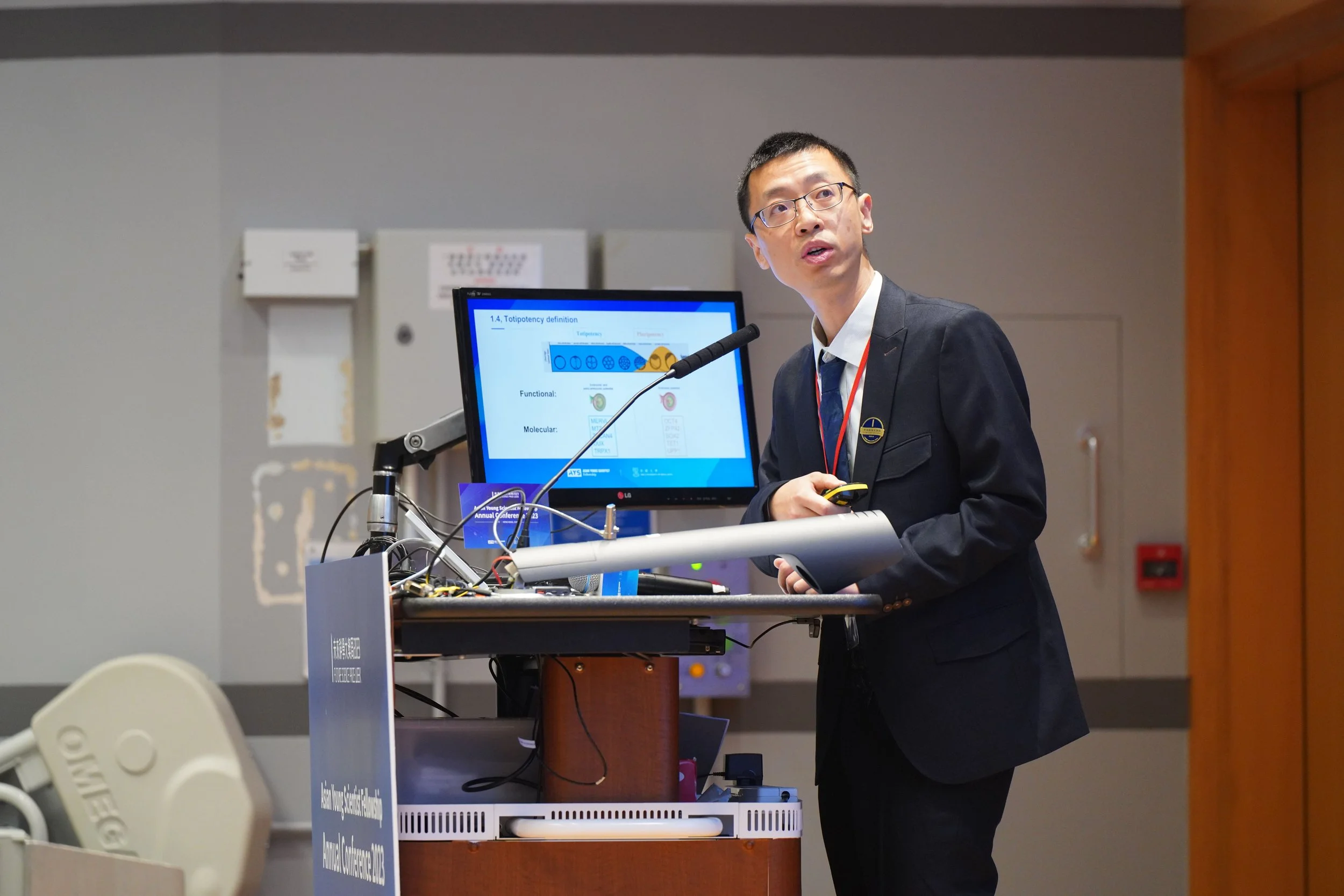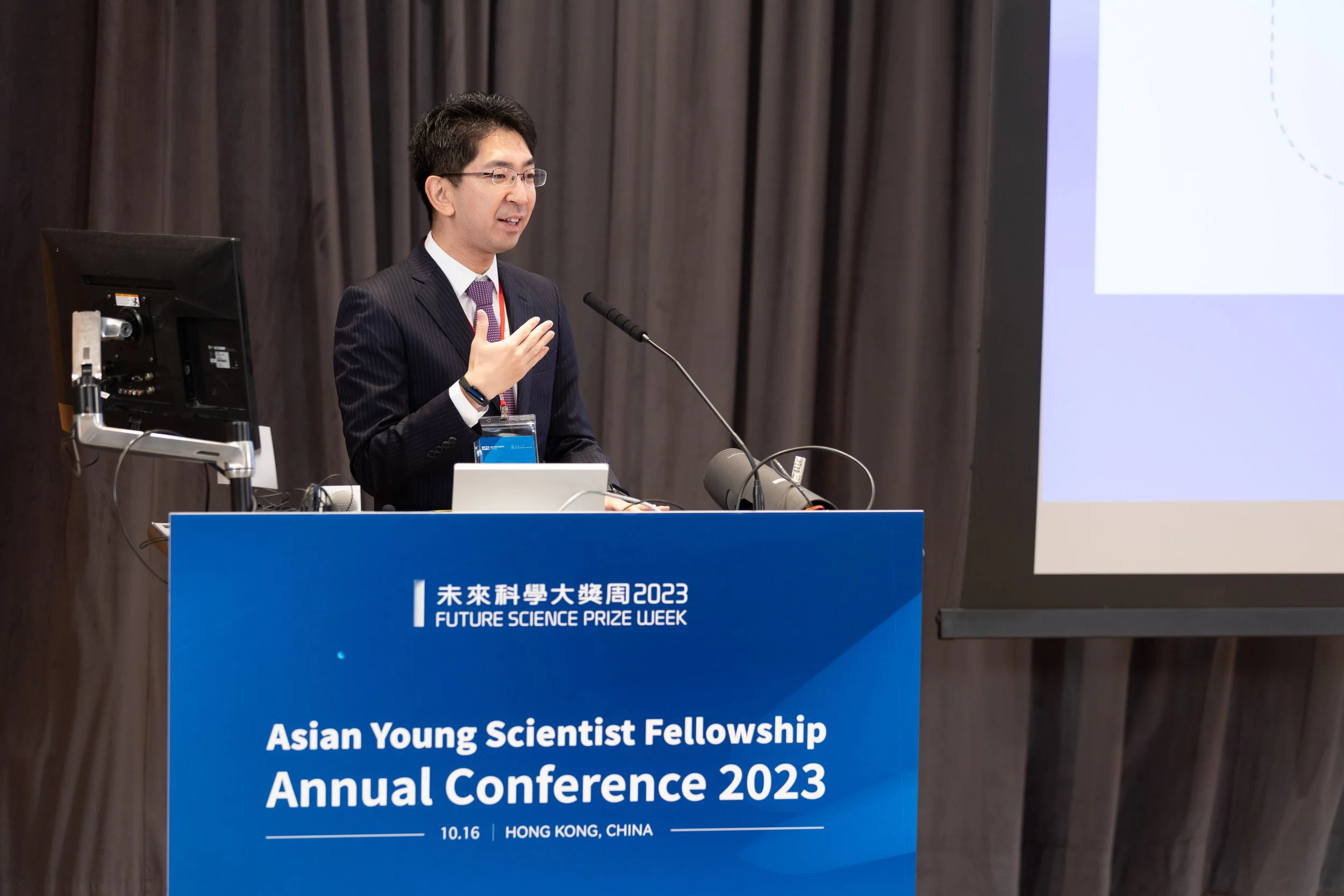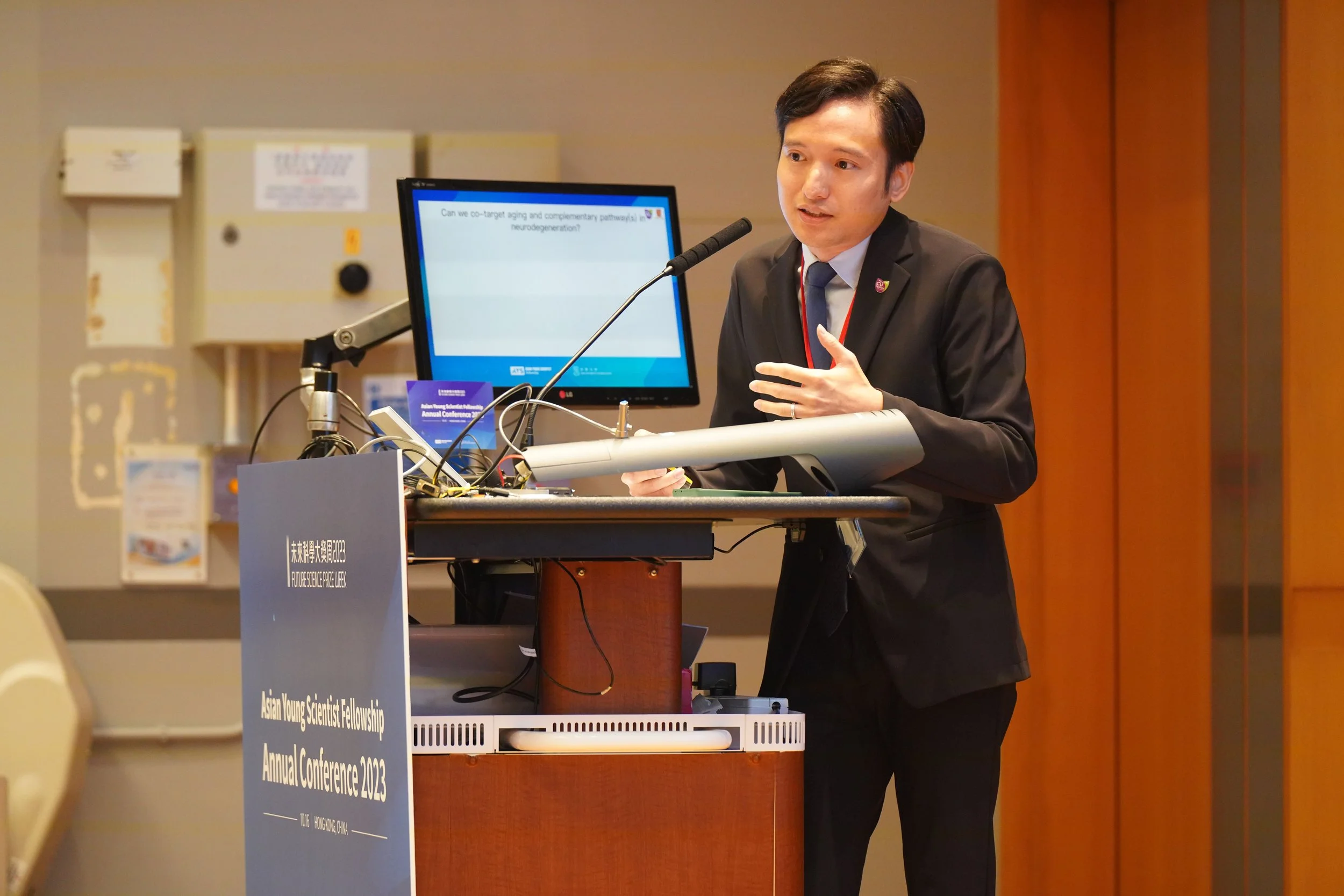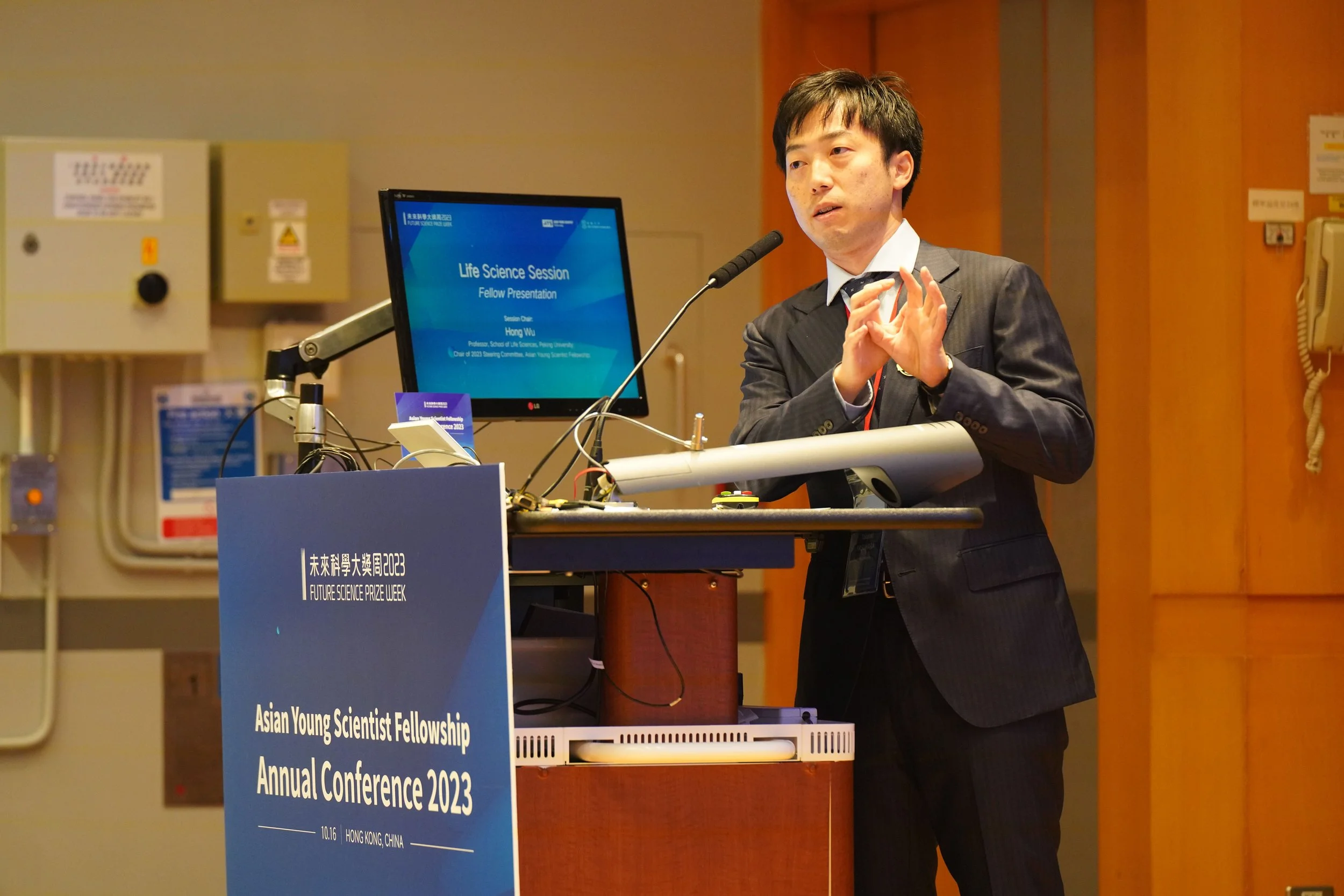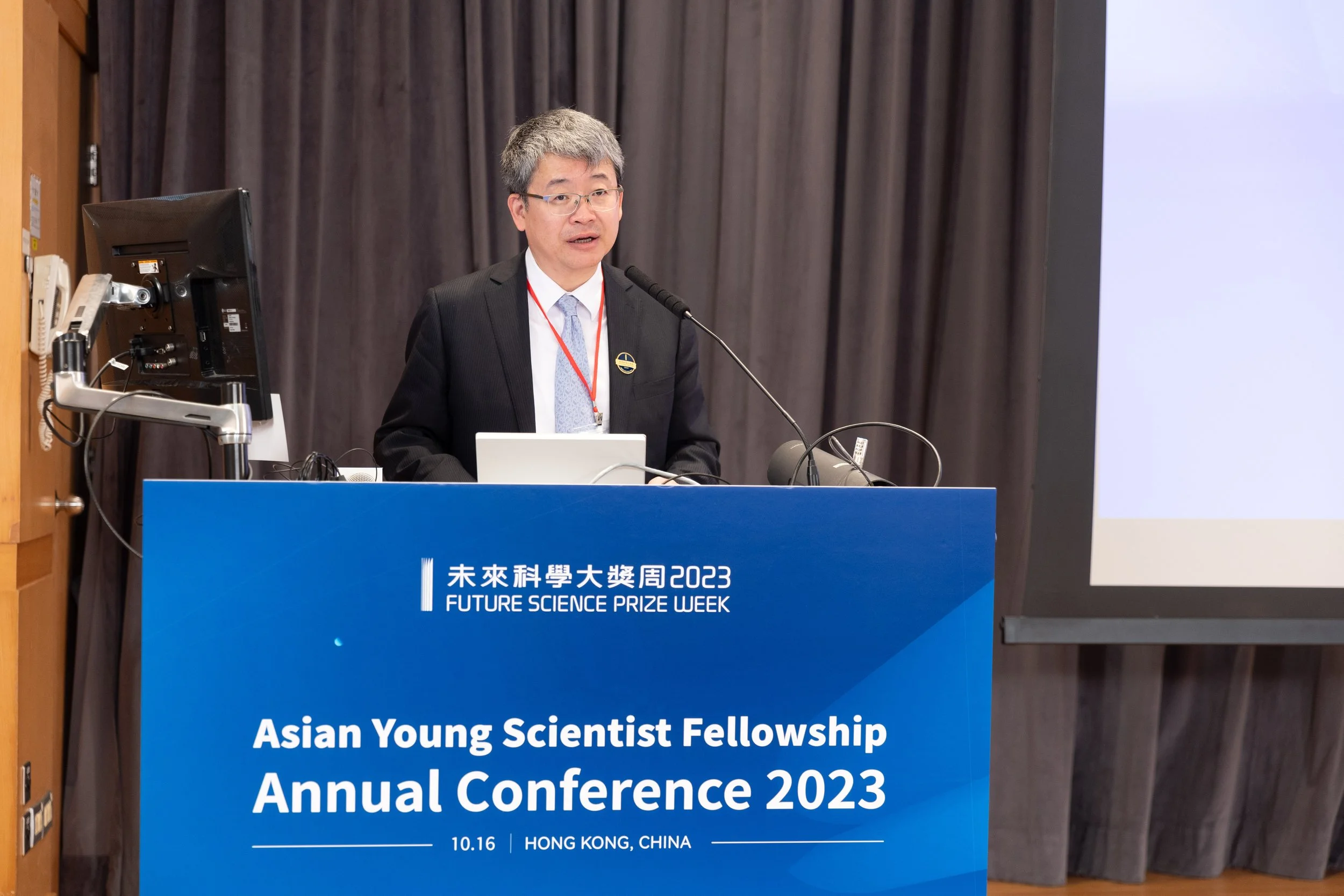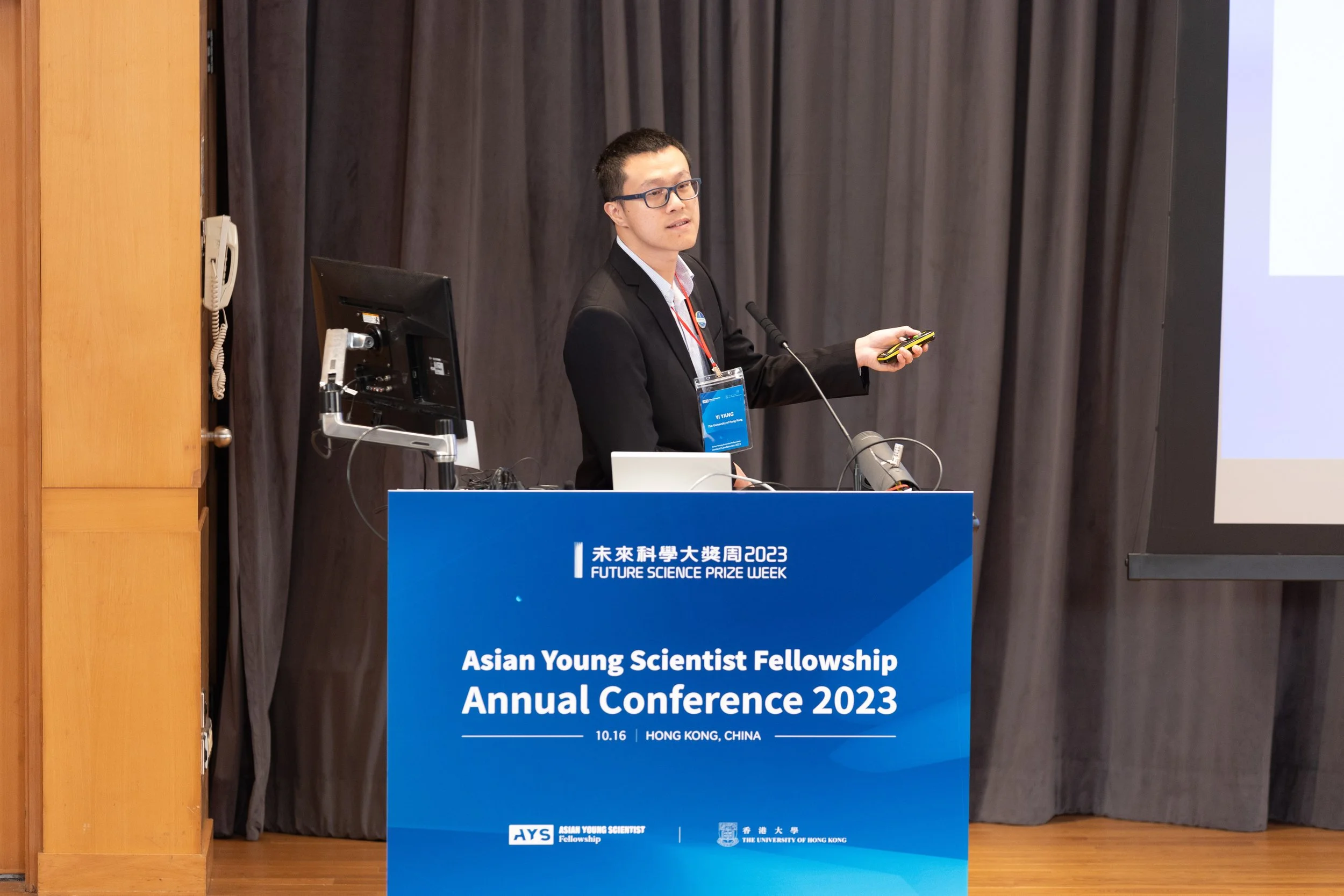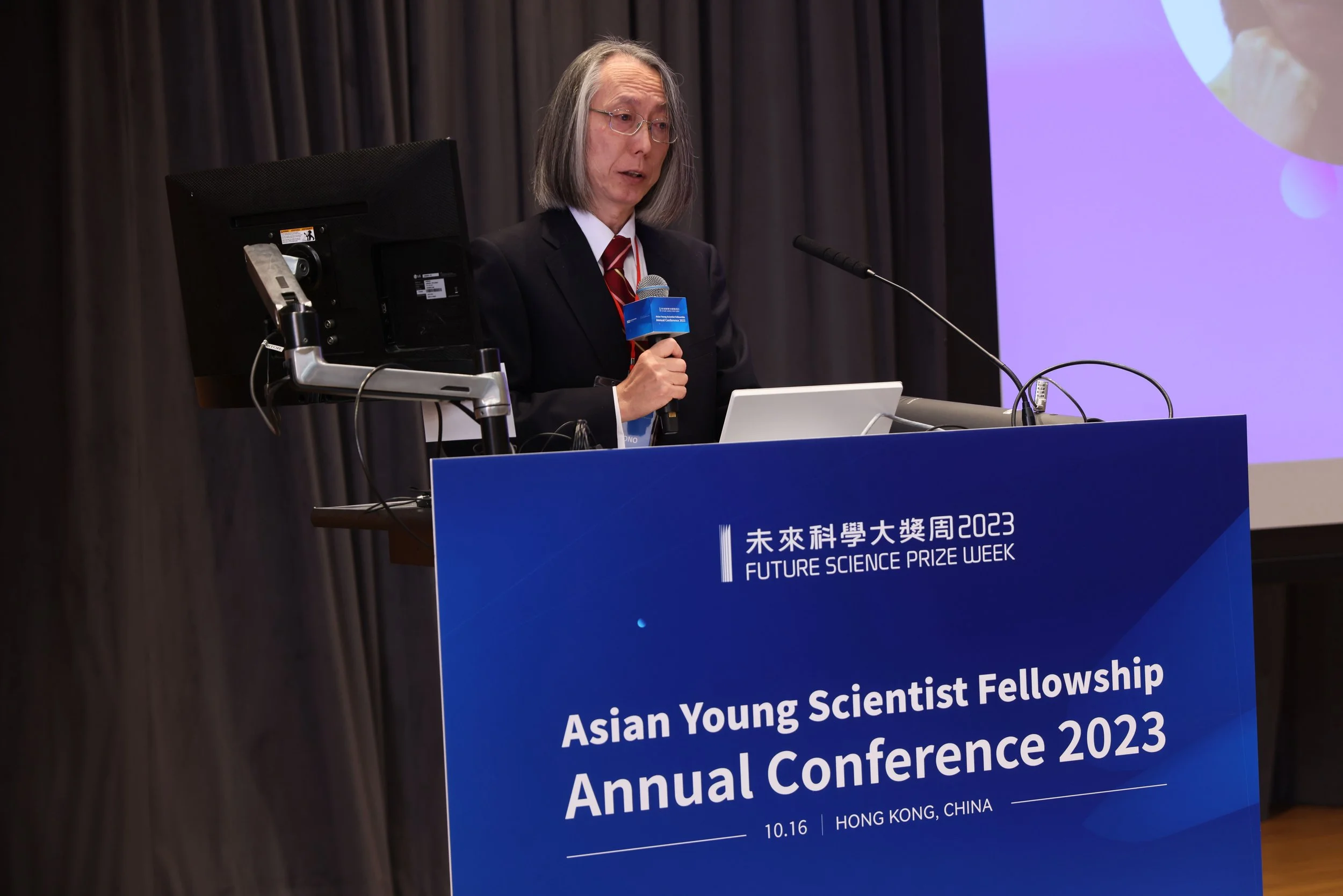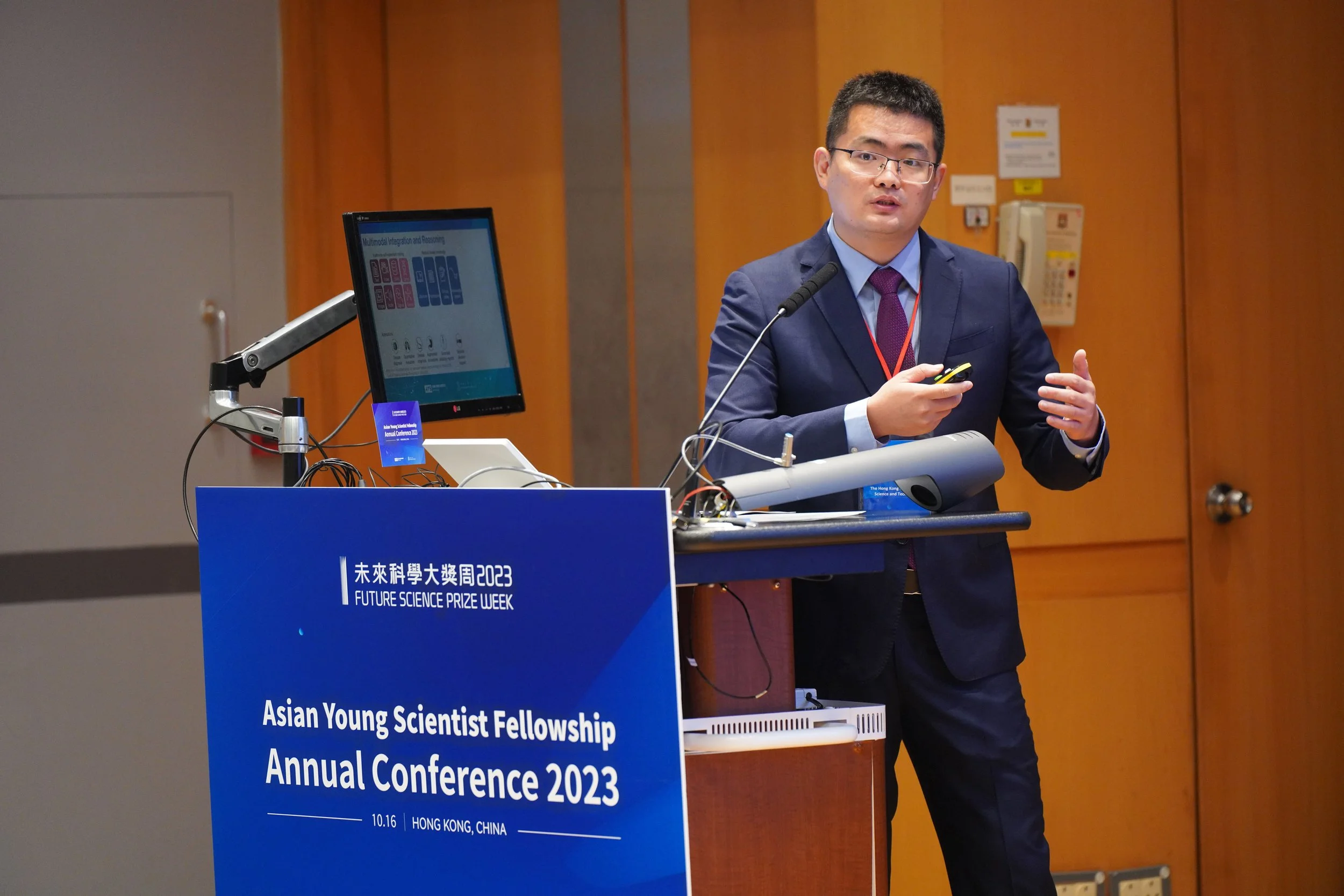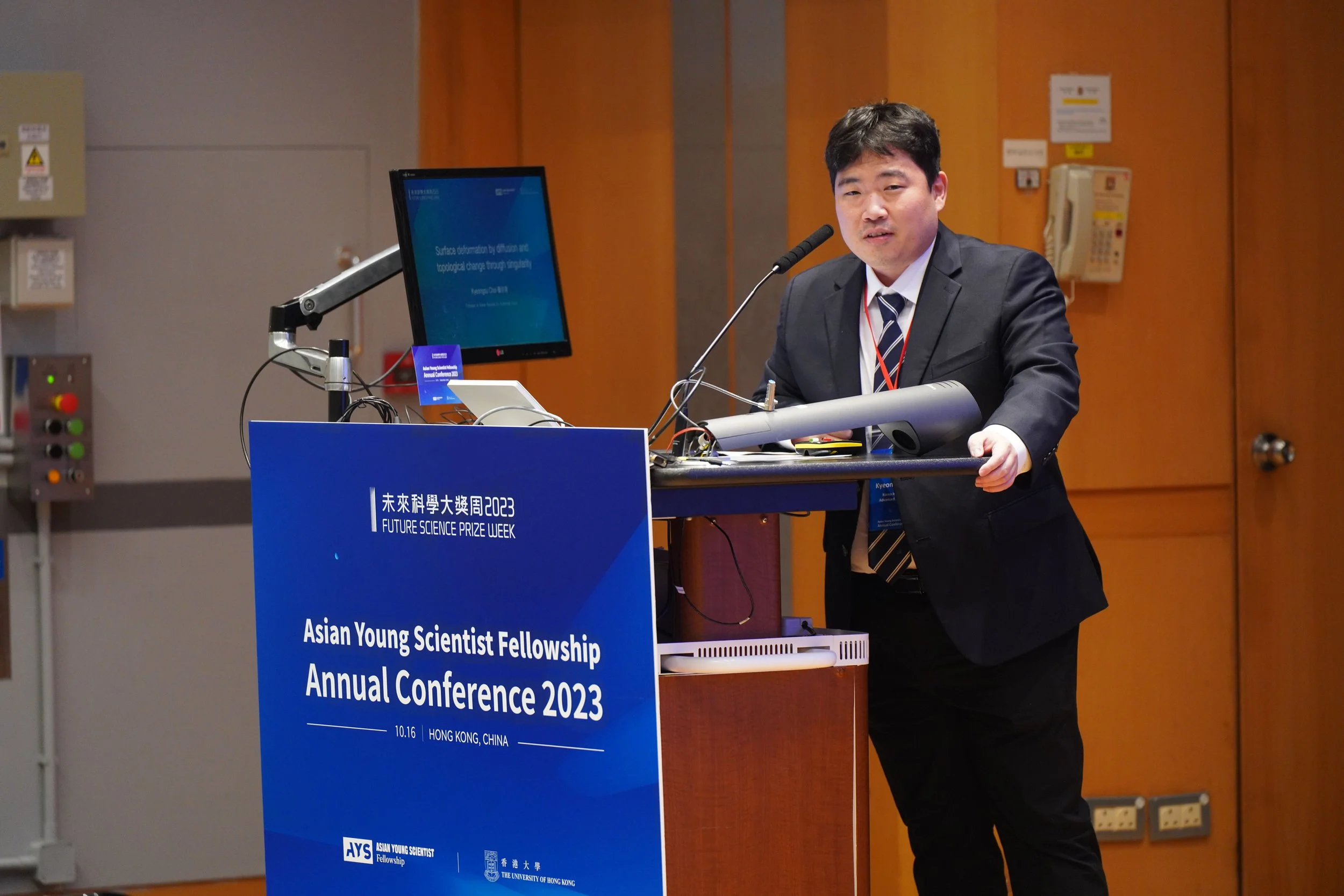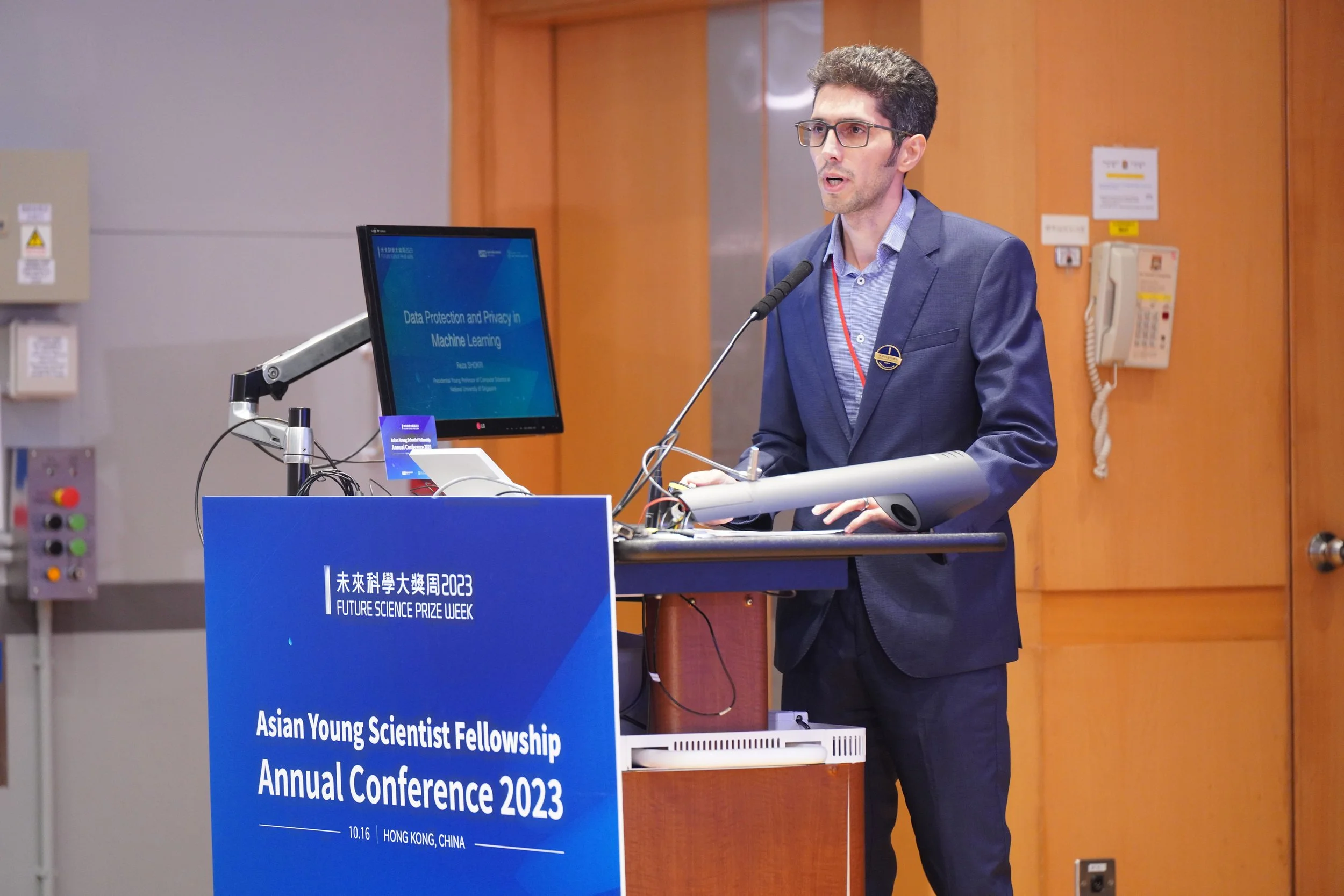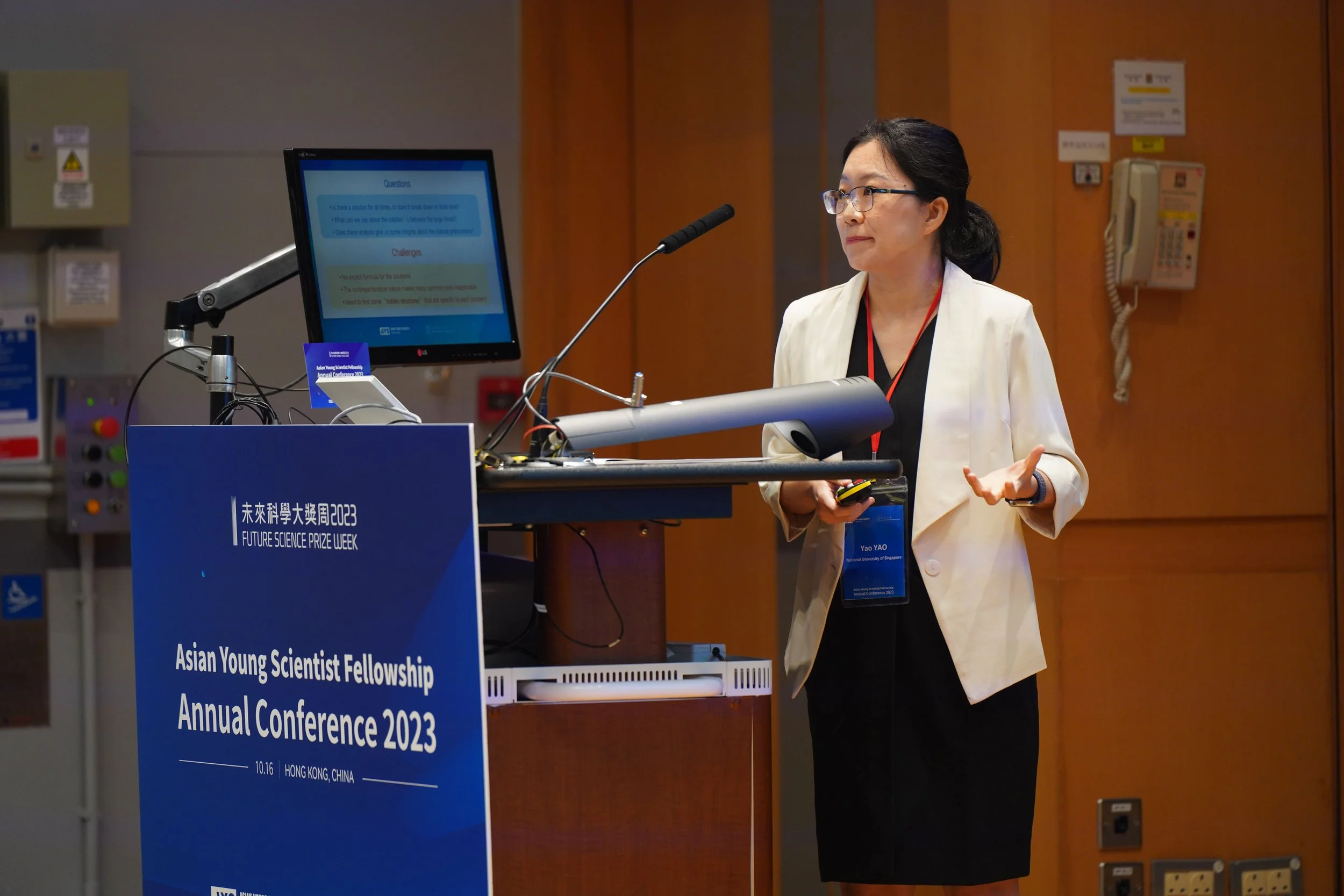Highlighted Fellow Presentations on 2023 AYS Fellowship Annual Conference
On 16 October, as one of the highlights of the "2023 Future Science Prize Week", the 2023 Asian Young Scientist Fellowship Annual Conference was held at the University of Hong Kong. Its aim is to encourage and support promising and outstanding young researchers in Asia to conduct pioneering research and to nurture future top-notch scientists.
Twelve outstanding young scientists from China, Japan, South Korea and Singapore gathered to brief their research results and engage in interdisciplinary dialogue and exchange. The young scientists explored cutting-edge scientific issues in the areas of Life Science, Physical Science and Mathematics and Computer Science, worked together to showcase the strengths of scientific research in Asia and build a platform for innovation and collaboration.
Fellow Presentation ——Focusing on the fields of life, physical, mathematics and computer, we take a global view of scientific issues.
Life Science Session
In the Life Science session, Hong Wu, Professor at the School of Life Sciences, Peking University, and Chair of 2023 Steering Committee of the Asian Young Scientist Fellowship, said, "It is a great pleasure to stand at the centre of this transformative research, where we are collectively defining the next frontier of life sciences." She noted that the Asian Young Scientist Fellowship has created a vibrant academic community where the life sciences, from genetics to cell biology, from neuroscience to regenerative medicine, are thriving in Asia, and it is great to see young scientists here continuing to push the boundaries of knowledge.
Peng Du, Associate Professor at Peking University and 2023 AYS Fellow in Life Science, gave a keynote speech on the topic of "Capturing and Maintenance of Totipotent Blastomere-like Cells ".
He pointed out that the totipotent fertilized egg is the starting point of individual development and can grow single cells into living individuals with the highest differentiation potential. The in vitro capture and culture technology of embryonic stem cells not only provides an important system for basic research in developmental biology, but also an important source of seed cells in translational medicine. However, to date, embryonic stem cells stably cultured in vitro have been in a pluripotent state. "In our recent studies, using the splicing inhibitor Pladienolide B, we were able to achieve stable in vitro cultures on mouse embryonic stem cells (ESCs), which are comparable at the molecular level to 2-cell and 4-cell ovoid spheres (known as fully cleaved ovoid-like cells TBLC). On this basis, we further achieved a stable culture of human totipotent stem cells and went on to investigate their potential applications in basic and clinical research." He stated.
Daishi Fujita, Associate Professor at Kyoto University and 2023 AYS Fellow in Life Science, gave a keynote speech on the topic of "Protein Behavior Within Precisely Engineered Spaces".
He noted that our exploration of the behaviour of proteins is restricted to precisely engineered nano-sized spaces, but synthesising molecules large enough to encapsulate the proteins is a formidable challenge, which makes our current research ground-breaking. "We have utilised innovative molecular synthesis techniques, which have paved the way for detailed studies of the proteins' constrained paving the way for unique behaviours that contrast with their behaviour in bulk environments. Enzymes confined in these cages experienced dramatic stabilisation. Upon detailed examination of this stabilising effect, we found that it was due to a cage-induced folding effect. This is not the only advantage of molecular caging. Our caging strategy increases the frequency of rare events and stabilises transient weak interactions, which is a key tool for unravelling complex molecular mechanisms that are not possible with traditional analytical methods." He noted that in collaboration with biologists, the team aims to further refine and extend this caging strategy, aspiring to gain deeper insights in the life sciences.
Ho Ko, Associate Professor at The Chinese University of Hong Kong and 2023 AYS Fellow in Life Science, gave a keynote speech on the topic of "The Quest to Extend Healthspan: A Neuroscientific Approach".
Identifying effective methods to counteract aging-associated changes is crucial for the development of therapeutics for many degenerative disorders, he said. However, we still lack a readily implementable approach to alleviate aging phenotypes. Here, we conducted deep phenotyping in the aging mouse to demonstrate that glucagon-like peptide-1 receptor (GLP-1R) agonist (GLP-1RA) treatment effectively attenuates body-wide age-related changes. The effects are evident at multiple molecular levels, including the transcriptomes of various tissues, organs and circulating white blood cells, the plasma metabolome, and are accompanied by functional improvements in cognitive and physical performance. The molecular anti-aging effects are sensitive to hypothalamic GLP-1R knockdown, and correlate strongly with mTOR inhibition. In a cohort of human subjects treated with a GLP-1RA, we are employing longitudinal blood multiomics to test potential generalization of the rejuvenation effects. Ho Ko noted that these findings have broad implications for the mechanistic understanding of the clinically observed pleiotropic effects of GLP-1RAs, the design of intervention trials for age-related diseases, and future developments of anti-aging-based therapeutics.
Takaaki Yasuhara, Professor at Kyoto University and 2023 AYS Fellow in Life Science, gave a keynote speech on the topic of "How Our Genome Is Protected From Mutagenesis".
He noted that It is critical for the maintenance of homeostasis that DNA damage, such as double-strand breaks (DSBs), within transcriptionally active regions, i.e., the most important part of our genome, undergo accurate repair. According to Takaaki Yasuhara, the team revealed that transcriptionally active regions are protected from genomic abnormalities, such as chromosome translocations, by two layers of mechanisms: 1) precise DSB repair mechanisms coupled with transcription and 2) suppression of the aberrant proximity of multiple active genes caused by phase-separated condensates formed at nucleoli. "Condensates Induced by Transcription Inhibition (CITIs) mediate gene fusion by involving transcriptionally active genes into nucleoli, suggesting that a transient stress response could cause permanent genomic abnormalities. Given that gene fusion is one of the major causes and consequences of diseases, including cancer, infertility, and Alzheimer's disease, our findings shed light on the fundamental mechanisms by which the homeostasis of our cells is maintained to avoid the onset of diseases." He stated.
Physical Science Session
In the Physical Science session, Prof Hong Ding, T. D. Lee Chair Professor of Tsung-Dao Lee Institute at Shanghai Jiao Tong University, and Chair of 2023 Program Committee of the Asian Young Scientist Fellowship Annual Conference, said in his speech that Industry 4.0 is constantly challenging our understanding of existing physics, urging us to be bold and imaginative, believing that in such adventures we will discover more wisdom and wonder.
Yue Gao, Assistant Professor at Fudan University and 2023 AYS Fellow in Physical Science, gave a keynote speech on the topic of "Organic Materials for Electrochemical Energy Storage".
He pointed out that Reducing CO2 emissions is a grand challenge for humanity that cannot be accomplished without further global electrification. Significant improvements in battery energy and power densities are required. Current batteries mainly rely on inorganic materials and are limited by their material properties and battery architecture. According to Yue Gao, the team's studies show that introducing electrochemically active organic materials into a high-energy-density battery interface can in situ form a more passive, homogeneous, and mechanically strong interphase, which enhances the lifespan and safety of lithium-metal, solid-state, and wide-temperature batteries. "Beyond that, we have been developing smart organic energy storage systems that utilize energy-dense organic molecules to provide higher energy densities (2-5 times than batteries) and short recharge time (within minutes). The organic energy cycle is more environmentally friendly and cost-efficient than batteries and gasoline." He said.
Tomoki Ozawa, Associate Professor at Tohoku University and 2023 AYS Fellow in Physical Science, gave a keynote speech on the topic of "Inter-Disciplinary and Inter-Dimensional Study of Topological Phases of Matter".
He noted that Since 1980, it was known in the community studying electrons in solids that a peculiar shape (or “topology) of quantum states of a material can lead to noticeable change in its edge/surface properties. Such phases of matter are called topological phases. In 2008, analogs of topological phases of matter were found to exist also in classical electromagnetic waves. Topological phenomena intrinsic to electromagnetic waves, such as topological lasers, have been found, leading to the formation of the field now known as topological photonics. Since then, topological phases have been studied in a variety of systems, from solid-state electrons and electromagnetic waves to collection of atoms, Newtonian mechanical systems, and even in the motion of biological matter. Tomoki Ozawa overview the developments of topological phases in various systems focusing on his own research contribution. In particular, the idea of synthetic dimensions, which is to use internal degrees of freedom of a particle as dimensions, greatly expand the possibility of realizing topological phases in atoms and light. "One may now consider performing experiments of four-dimensional physics in the lab. " He said.
Yi Yang, Assistant Professor at University of Hong Kong and 2023 AYS Fellow in Physical Science, gave a keynote speech on the topic of "Flatbands for Free-Electron-Light Interaction".
He noted that Flatbands, which are regions in a band structure where energy levels remain constant over a range of momenta, have proven to be highly influential in various fields of physics and applications. In condensed matter, flatbands exhibit comparable energy bandwidth and Coulomb interaction, leading to correlated phenomena. In photonics, they facilitate the development of high-performance photonic devices such as slow light and lasing. Furthermore, flatbands support supercollimation, enabling the propagation of wavepackets without diffraction in both electronic and photonic systems. Flat bands bring benefits in a hybrid electronic-photonic system by enhancing the interaction between free electrons and photons, said Yi Yang. To achieve this, we design flatband resonances within a silicon-on-insulator photonic crystal slab, allowing us to control and enhance the emission of free-electron radiation by manipulating the trajectory and velocity of the electrons. This enhancement enables us to shape the polarization of free-electron radiation and investigate photonic bands through electron-beam measurements. These findings highlight the utility of flatbands as platforms for studying strong interactions between light and free electrons, particularly in the context of efficient and miniaturized free-electron nanophotonic devices.
Huaxing Zhu, Associate Professor at Peking University and 2023 AYS Fellow in Physical Science, gave a keynote speech on the topic of "Strong Interactions of Quarks and Gluons at the Frontier of the Large Hadron Collider".
He noted that Quantum Chromodynamics (QCD) serves as the fundamental theory describing strong nuclear interactions, playing a crucial role in the binding of quarks to form protons and neutrons. Over the past half-century, significant advancements have been made in unraveling the nature of QCD; however, a complete picture is still missing. Huaxing Zhu outlined two recent breakthroughs in this field. Firstly, a meticulous examination of the transverse momentum distribution of quarks and gluons within high-energy protons has yielded precise insights. Secondly, present the first results regarding the of real-time confinement phenomenon, elucidating the process by which quarks and gluons transform into hadrons. " These findings bring us closer to a deeper understanding of QCD and its fundamental processes." He said.
Mathematics and Computer Science Session
In the Mathematics and Computer Science, session, Kaoru Ono, Professor at the Research Institute for Mathematical Sciences, Kyoto University, and Co-Chair of 2023 Mathematics and Computer Science Sub-Committee of the Asian Young Scientist Fellowship , thanked the audience and introduced the speakers' research experiences and presentation topics.
Hao Chen, Assistant Professor at The Hong Kong University of Science and Technology and 2023 AYS Fellow in Mathematics and Computer Science, gave a keynote speech on the topic of "Trustworthy Artificial Intelligence for Healthcare".
He pointed out that Artificial Intelligence (AI) has revolutionized the healthcare industry by achieving or surpassing human performance in various tasks, thanks to the remarkable advancements in AI techniques and the unprecedented access to medical data. However, despite its impressive capabilities, AI still faces challenges in its trustworthiness, such as a lack of generalization and explainability, which hinder its widespread application in real-world scenarios. Therefore, it is crucial to enhance the credibility of AI to increase the trust and confidence of medical professionals and patients in adopting these techniques. Hao Chen shared the latest progress in developing trustworthy AI methods, including medical foundation models, multimodal integration, and explainable AI for disease diagnosis and prognosis. He said that by exploring the existing challenges and future directions, the research and development of trustworthy AI in healthcare will be further promoted.
Kyeongsu Choi, Professor at Korea Institute for Advanced Study (KIAS) and 2023 AYS Fellow in Mathematics and Computer Science, gave a keynote speech on the topic of "Surface deformation by diffusion and topological change through singularity".
He pointed out that The mean curvature flow is an evolution of surface satisfying a geometric heat equation. The flow naturally develops singularities, and the topology of the surface is changed through the singularities. As a diffusion equation, the flow arrives in equilibrium at singularities. Although there are infinitely many shapes of equilibrium, a round sphere and round cylinders are the only stable equilibrium. Hence, one can slightly perturb the flow so that the perturbed flow only develops spherical or cylindrical singularities. Kyeongsu Choi said that we can study how the flow changes the surface's topology through cylindrical singularities. To this end, it is also required to show that the flow is well-defined through the cylindrical singularities, where the surface is not differentiable and thus it is not a classical solution to the differential equation." By considering the flow as a gradient flow, we can show that the flow has positive speed near the cylindrical singularities, which means that the flow foliates the space. This proved that the flow is well-defined." He spoke of.
Reza Shokri, Assistant Professor at National University of Singapore and 2023 AYS Fellow in Mathematics and Computer Science, gave a keynote speech on the topic of "Data Protection and Privacy in Machine Learning".
He said that the issue of privacy breaches in machine learning is of paramount importance, and the quantitative assessment of privacy risks associated with AI algorithms is a pivotal topic in data privacy. Reza Shokri and his team have created the ongoing initiatives and widely recognized practices in creating standardized privacy auditing processes and tools (privacy-meter.com), leveraging membership inference algorithms, to identify vulnerable algorithms and test their compliance with privacy guidelines. Aiding the data protection impact assessment process by quantifying the underlying privacy risks of machine learning models. In addition, he talked about the relationship between this strategy and differential privacy, as well as private computing, emphasizing the criticality of an algorithm's resilience against privacy attacks.
Yao Yao, Associate Professor at National University of Singapore and 2023 AYS Fellow in Mathematics and Computer Science, gave a keynote speech on the topic of "Understanding Fluid Dynamics and Collective Behavior with Partial Differential Equations".
She pointed out that While fluid dynamics and collective behavior of animals seem to be two very different phenomena, it turns out that they can both be effectively modeled using partial differential equations. Mathematically, the equations for these different models share a similar structure: they all capture the evolution of certain quantity transported by a velocity field. In this presentation, Yao Yao describe the questions of interest and the challenges we face in their analysis, and discusses them using the examples the aggregation-diffusion equation in collective dynamics and the Euler equation in fluid dynamics. She said, " Mathematically, we aim to understand whether there exists a solution to these equations for all times, and the large-time behavior of solutions. The nonlinear and nonlocal nature of these equations renders many common tools in analysis inapplicable, thus we need to discover some “hidden structures” that are specific to each problem. "


